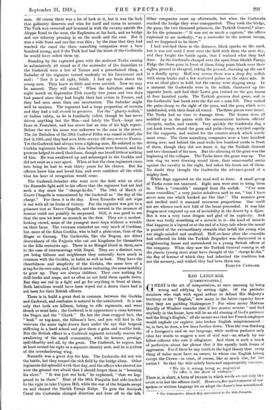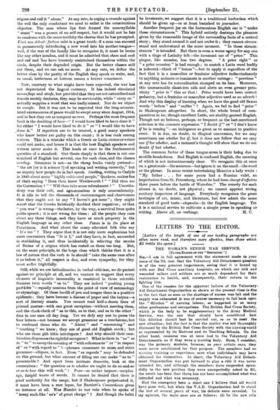BAD LANGUAGE.
[COMMUNICATED.]
GREAT is the art of misquotation, at once amusing by being wrong and edifying by setting right. Of the patriotic numbers who rm.& with equal. ardour to defend His Majesty's
territory or his "English," how many in the latter capacity know that they are garbling Shakespeare ? For when merry Mistress Quickly of Windsor remarks that if her master returns "and find anybody in the house, here will be an old abusing of God's patience as, in fact, he does, a few lines further down. Thus she was thinking of a foreigner's raid on our language, while modem parlance only cites her words to suggest a sort of civil war—an attack by our fellow-cidzens who owe it allegiance. And there is such a touch of perfection about her phrase that it fits equally both forma of
aggression. For if there be any truth in the legal theory that every thing of value must have an owner, to whom can English belong except the Crown—in trust, of course, like so much else, for the nation ? So that the title subtly hints and imperceptibly conveys : "We do it wrong, being so majestical
To offer it the show of violence."
There is, in short, a form of treason in which words am not only the overt acts but the offence itself. However,4or maltreatment of our spolten or written language let us adopt the dame's less sensational • The Commander, Ahmed Bey. surrendered 10 iho 90111 Punlabhi. stigma and call it" abuse." At any rate, in urging a crusade against the evil the only combatant we need to enlist is the conscientious objector. The man whose lips first framed the monosyllable " stunt " was a person of no self-respect, but it would not be fair to condemn with the same acerbity the chorus that he has prompted. Fieri non debuit factors valet is a great truth: if a man can succeed in permanently introducing a new word into his mother-tongue- well, if the rest of the family like to recognize it, it must be borne like any other incubus, and it must be admitted that sham and srwb and cad and 'bus have brazenly maintained themselves within the circle, despite their degraded origin. But the better classes still out them, and we can ask no more. At any rate, we define the better class by the purity of the English they speak or write, and, as usual, bettemess at bottom means a braver conscience.
Now, contrary to what might have been expected, the war has not depreciated the lingual currency. It has indeed circulated camouflage and strafe, but provided that they are not naturalized and remain merely denizens, they may be serviceable, while " carry on" actually supplies a word that was badly missed. Nor do we object to wangle. But it was not to be expected that the long-accumu- lated excrescences of peace would be swept away since August, 1914, and in fact they are as rampant as ever. Perhaps the most frequent fault is the doubling of have—" I would have liked to have done it" for either "I would have liked to do it" or "I would like to have done it." If reporters are to be trusted, a good many speakers who know better are guilty on this count ; it is less rank among writers. This is a mistake which a Greek or Latin orator orwriter could not make, and hence it is that the best English speakers and writers never make it. This leads at once to the fundamental question of a standard. Our thesis simply is that there is not one standard of English but several, one for each class, and the classes overlap. Grammar is not—as the cheap books vainly pretend- " the art [or is it science ?] of speaking and writing correctly," but an inquiry how people do in fact speak. sterling, writing to Carlyle in 1840 about some " highly cultivated people," Quakers, makes fan of their saying "Does thou know Wordsworth ? " "Did thou see the Coronation ? " "Will thou take some refreshment ? " Unortho- doxy was their cult, and agraznmatism is only nonconformity. It is idle to tell the thousands of costermongers and charwomen that they ought not to say "I haven't got none " ; they might retort that the Greeks habitually doubled their negatives ; or that "you was" is wrong—the latter, by the way, a survival from quite polite speech ; it is not wrong for them : all the people they care about say these things, and they have as much property in the English language as any other class. Patois is in its place at Patavinum. And what about the many educated folk who say " It's me " ? They argue that it is not only more euphonious but more convenient than "It is I," and they have, in fact, succeeded in stabliahing it, and thus incidentally in relieving the monks of Reims of a stigma which has rested on them too long. But, on the same principle, to the large class which thinks that it is a law of nature that the verb to be should" take the same case after it as before it," all respect is due, and even sympathy, for they must suffer frightfully.
Still, while we are latitudinarian in verbal criticism, we do protest against no principle at all, and we venture to suggest that every element of linguistic immorality is combined in those microbic Siamese twin words "as to." They are indeed "pushing young particles "—equally noxious from the point of view of entomology or etymology. Of these bacilli of pen and tongue there is a positive epidemic,: they have become a disease of paper and the larynx—a sort of literary ataxia. You cannot read half-a-dozen lines of printed matter—with one great exception—without meeting them, and the cluck-cluck of "as to this, as to that, and as to the other" dins in our ears all day long. Yet we defy any one to parse the four letters—not because we accept graanrnar as a touchstone, but to confound those who do. " About " and " concerning " and " touehing " we know; they are of good old English stock ; but who are these glib little interlopers? And why should their com- bination dispossess the rightful occupiers? What isthere in " as " or in " to " to usurp the meaning of " vrith reference to " or "in respect of" or with regard to" ?—phrases consonant to sense and strict grammar—ellipses, in fact. Even "as regards" may be defended on this ground, but what amount of filling out can make " as to" presentable ? And apart from intrinsic demerits, look at the connexions "the question as to whether we ought to do so-and-so or on to how this will work " ! Pure—or rather impure—surplus- age, insipid waste of words. It cannot be denied that there is good authority for the usage, but if Shakespeare perpetuated it it must have been a rare lapse, for Bartlett's Concordance givew no instance at all. Was Hamlet in our vein when he spoke of " many such-like ' as's ' of great charge " ? And though the habit
be inveterate, we suggest that it is a traditional barbarism which should be given up—or at least banished to journalese.
Another frequent jar on the harmonious English ear is "under these circumstances." This hybrid entirely destroy; the pleasure given by the reasonable image of the surrounding facts of a central story ; they stand around it and not under It; they cannot dream- stand and under-stand at the same moment. "In these denim- stances " is intended. But there is even a worse agony for any one with a tinge of Latinity left—the incessant use of "prior." This plague, like measles, has two degrees. "A prior right" or "a prior occasion" is bad enough ; to snatch a Latin word bodily is indecent—think of "bonus "—but to apply it regardless of the fact that it is a masculine or feminine adjective indiscriminately to anything animate or inanimate is another outrage : " previous " at any rate has its naturalization stamped on it few. Moreover, this unseasonable classicism aids and abets an even grasser pate- vinity "prior to" this or that ! Prins would have been correct pedantry, but a feminine or masculine adjective used as an adverb ! And why this display of learning when we have the good old Saxon words " before " and " earlier " ? Again, we fail to find " prior " in Shakespeare altogether. In short, the whole brood of com- paratives in ior, though excellent Latin, are shabby-genteel English. Though not so heinous, perhaps, or frequent as the last-mentioned solecism is the common expression "1 doubt if" or "1 don't know if he is coming "—an inelegance so great as to amount to positive error. It is due, no doubt, to illogical conversion, for we may sometimes use whether for if, but it does not follow that we may use if for whether, and a moment's thought will show that we do not doubt if but whether.
The common factor of these tongue-sores is their being dee to muddle-headednesa. Bad English is confused English, the meaning of which is not instantaneously clear. We recognize this at once on a great scale—the sentence—but ignore it on the small—the word or the phrase. In some recent entertaining Memoirs a lady wrote : " My father . . . for some years had a Russian valet, an importation from St. Petersburg, where he had been chargé craffaires three years before the battle of Waterloo." The remedy for such abuses is, no doubt, not physical ; we cannot appoint roving- sanitary inspectors of language. Everybody recognizes the great heritages of art, music, and literature, but few admit the same standard of good taste—elegantio.—In the English language. Yet ft is a national service to cultivate a simple prose in speaking or
writing. Above all, no verbiage. H. C.



































 Previous page
Previous page